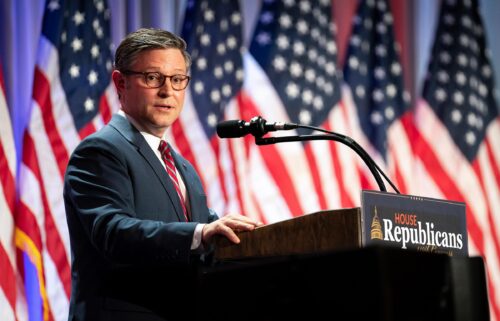Polls find most Republicans say 2020 election was stolen and roughly one-quarter embrace QAnon conspiracies
Most Americans reject QAnon-linked conspiracy theories and believe that Donald Trump lost legitimately in 2020, a set of new polling finds. But a substantial minority within the Republican party endorses some of those theories, and most continue to baselessly question the outcome of last year’s election.
About one-quarter of Republicans, 23%, agree with a set of conspiratorial beliefs linked to the QAnon movement, according to a PRRI report released Thursday. These believers said they mostly or completely agreed that “the government, media, and financial worlds in the U.S. are controlled by a group of Satan-worshipping pedophiles who run a global child sex trafficking operation,” that “there is a storm coming soon that will sweep away the elites in power and restore the rightful leaders,” and, finally, that “because things have gotten so far off track, true American patriots may have to resort to violence in order to save our country.” Among the full American public, 14% mostly or completely agree with all those statements, with a broad majority saying they disagree.
Beyond partisanship, belief in QAnon conspiracy theories is also strongly associated with consumption of far-right media, the report finds. Only a fraction of the public, about 3%, report that their most trusted TV news sources were right-wing networks like One America News and Newsmax. But nearly half of that group say they believed in “a storm coming soon,” with 42% agreeing that “patriots may have to resort to violence” and 40% that “a group of Satan-worshipping pedophiles” control US government, media and finance. The findings don’t indicate whether consuming far-right media instills these beliefs in viewers, or whether believers in those theories tend to gravitate to such news sources.
Attempting to quantify the precise share of the public who subscribe to a particular theory is often challenging — the depth and intensity of people’s beliefs vary, making it rarely as simple as a yes or no question. That’s especially true in the case of QAnon, which the PRRI report describes as a “loosely connected belief system” that “involves a constantly evolving web of schemes.” A small core of QAnon supporters, for instance, actively identify themselves with the movement; others might be less actively engaged, but still sympathetic to that brand of conspiratorial thinking if asked. Further complicating matters, partisans sometimes express extreme or incorrect views to pollsters partially as a form of political signaling.
While fully embracing QAnon talking points remains a minority position within the GOP, denying the legitimacy of the 2020 election has become the mainstream position inside the party.
A majority of Republicans, 56%, say they believe that the 2020 election was the result of illegal voting or election rigging, per an Ipsos/Reuters poll released last week, with about 6 in 10 agreeing with the statement that “the 2020 election was stolen from Donald Trump.” Republicans also say, 54% to 30%, that they agree with the myth that the January 6 riot at the US Capitol “was led by violent left-wing protestors trying to make Trump look bad.” The rioters who breached the Capitol were Trump supporters, and sources ranging from the FBI to alleged participants in the riot have shot down the notion that left-wing agitators were involved.
One-quarter of the American public as a whole say they think last year’s election outcome was determined by illegal voting or election rigging, with about 30% saying the election was stolen from Trump and roughly one-third that the Capitol riot was led by left-wingers.
Polls, however, show even more pronounced partisan divides on how the country should chart a path forward. In a new Quinnipiac survey, 74% of Republicans say that “too much is being made of the storming of the U.S. Capitol on January 6th and it is time to move on,” compared with just 18% who say that it was an “attack on democracy that should never be forgotten.” Overall, 55% of Americans say that January 6 should never been forgotten, and 39% that it’s time to move on.
Meanwhile, few voters are sanguine about the political state of the country. A 64% majority of registered voters, including similar shares in both parties, think that political divisions pose a major threat to the United States, per a new Fox News poll.




